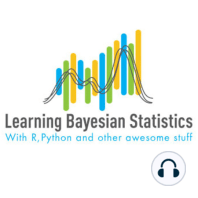12 min listen

#17 Reparametrize Your Models Automatically, with Maria Gorinova
#17 Reparametrize Your Models Automatically, with Maria Gorinova
ratings:
Length:
52 minutes
Released:
Jun 4, 2020
Format:
Podcast episode
Description
Have you already encountered a model that you know is scientifically sound, but that MCMC just wouldn’t run? The model would take forever to run — if it ever ran — and you would be greeted with a lot of divergences in the end. Yeah, I know, my stress levels start raising too whenever I hear the word « divergences »…
Well, you’ll be glad to hear there are tricks to make these models run, and one of these tricks is called re-parametrization — I bet you already heard about the poorly-named non-centered parametrization?
Well fear no more! In this episode, Maria Gorinova will tell you all about these model re-parametrizations! Maria is a PhD student in Data Science & AI at the University of Edinburgh. Her broad interests range from programming languages and verification, to machine learning and human-computer interaction.
More specifically, Maria is interested in probabilistic programming languages, and in exploring ways of applying program-analysis techniques to existing PPLs in order to improve usability of the language or efficiency of inference.
As you’ll hear in the episode, she thinks a lot about the language aspect of probabilistic programming, and works on the automation of various “tricks” in probabilistic programming: automatic re-parametrization, automatic marginalization, automatic and efficient model-specific inference.
As Maria also has experience with several PPLs like Stan, Edward2 and TensorFlow Probability, she’ll tell us what she thinks a good PPL design requires, and what the future of PPLs looks like to her.
Our theme music is « Good Bayesian », by Baba Brinkman (feat MC Lars and Mega Ran). Check out his awesome work at https://bababrinkman.com/ (https://bababrinkman.com/) !
Links from the show:
Maria on the Web: http://homepages.inf.ed.ac.uk/s1207807/index.html (http://homepages.inf.ed.ac.uk/s1207807/index.html)
Maria on Twitter: https://twitter.com/migorinova (https://twitter.com/migorinova)
Maria on GitHub: https://github.com/mgorinova (https://github.com/mgorinova)
Automatic Reparameterisation of Probabilistic Programs (Maria's paper with Dave Moore and Matthew Hoffman): https://arxiv.org/abs/1906.03028 (https://arxiv.org/abs/1906.03028)
Stan User's Guide on Reparameterization: https://mc-stan.org/docs/2_23/stan-users-guide/reparameterization-section.html (https://mc-stan.org/docs/2_23/stan-users-guide/reparameterization-section.html)
HMC for hierarchical models -- Background on reparameterization: https://arxiv.org/abs/1312.0906 (https://arxiv.org/abs/1312.0906)
NeuTra -- Automatic reparameterization: https://arxiv.org/abs/1903.03704 (https://arxiv.org/abs/1903.03704)
Edward2 -- A library for probabilistic modeling, inference, and criticism: http://edwardlib.org/ (http://edwardlib.org/)
Pyro -- Automatic reparameterization and marginalization: https://pyro.ai/ (https://pyro.ai/)
Gen -- Programmable inference: http://probcomp.csail.mit.edu/software/gen/ (http://probcomp.csail.mit.edu/software/gen/)
TensorFlow Probability: https://www.tensorflow.org/probability/ (https://www.tensorflow.org/probability/)
This podcast uses the following third-party services for analysis:
Podcorn - https://podcorn.com/privacy
Well, you’ll be glad to hear there are tricks to make these models run, and one of these tricks is called re-parametrization — I bet you already heard about the poorly-named non-centered parametrization?
Well fear no more! In this episode, Maria Gorinova will tell you all about these model re-parametrizations! Maria is a PhD student in Data Science & AI at the University of Edinburgh. Her broad interests range from programming languages and verification, to machine learning and human-computer interaction.
More specifically, Maria is interested in probabilistic programming languages, and in exploring ways of applying program-analysis techniques to existing PPLs in order to improve usability of the language or efficiency of inference.
As you’ll hear in the episode, she thinks a lot about the language aspect of probabilistic programming, and works on the automation of various “tricks” in probabilistic programming: automatic re-parametrization, automatic marginalization, automatic and efficient model-specific inference.
As Maria also has experience with several PPLs like Stan, Edward2 and TensorFlow Probability, she’ll tell us what she thinks a good PPL design requires, and what the future of PPLs looks like to her.
Our theme music is « Good Bayesian », by Baba Brinkman (feat MC Lars and Mega Ran). Check out his awesome work at https://bababrinkman.com/ (https://bababrinkman.com/) !
Links from the show:
Maria on the Web: http://homepages.inf.ed.ac.uk/s1207807/index.html (http://homepages.inf.ed.ac.uk/s1207807/index.html)
Maria on Twitter: https://twitter.com/migorinova (https://twitter.com/migorinova)
Maria on GitHub: https://github.com/mgorinova (https://github.com/mgorinova)
Automatic Reparameterisation of Probabilistic Programs (Maria's paper with Dave Moore and Matthew Hoffman): https://arxiv.org/abs/1906.03028 (https://arxiv.org/abs/1906.03028)
Stan User's Guide on Reparameterization: https://mc-stan.org/docs/2_23/stan-users-guide/reparameterization-section.html (https://mc-stan.org/docs/2_23/stan-users-guide/reparameterization-section.html)
HMC for hierarchical models -- Background on reparameterization: https://arxiv.org/abs/1312.0906 (https://arxiv.org/abs/1312.0906)
NeuTra -- Automatic reparameterization: https://arxiv.org/abs/1903.03704 (https://arxiv.org/abs/1903.03704)
Edward2 -- A library for probabilistic modeling, inference, and criticism: http://edwardlib.org/ (http://edwardlib.org/)
Pyro -- Automatic reparameterization and marginalization: https://pyro.ai/ (https://pyro.ai/)
Gen -- Programmable inference: http://probcomp.csail.mit.edu/software/gen/ (http://probcomp.csail.mit.edu/software/gen/)
TensorFlow Probability: https://www.tensorflow.org/probability/ (https://www.tensorflow.org/probability/)
This podcast uses the following third-party services for analysis:
Podcorn - https://podcorn.com/privacy
Released:
Jun 4, 2020
Format:
Podcast episode
Titles in the series (100)
#0 What is this podcast? by Learning Bayesian Statistics